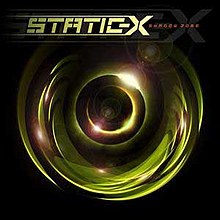Shadow Zone (album)
| Shadow Zone | ||||
|---|---|---|---|---|
 |
||||
| Studio album by Static-X | ||||
| Released | October 7, 2003 | |||
| Recorded | Summer 2003 | |||
| Genre | ||||
| Length | 39:26 | |||
| Label | Warner Bros. | |||
| Producer |
|
|||
| Static-X chronology | ||||
|
||||
| Singles from Shadow Zone | ||||
Shadow Zone is the third album by the band Static-X, released on October 7, 2003. Marked by many personnel and stylistic changes, the album sports a much more melodic sound than any other work in their catalog, while still staying in the confines of their industrial metal and nu metal sound.
In 2002, Static would be contacted by Jonathan Davis of the nu metal band Korn. Davis had recently signed on to provide the soundtrack for the Queen of the Damned film soundtrack, but due to contract limitations with Sony, was legally unable to actually perform the music he had written for the soundtrack. As a remedy of this, Davis contacted a number of metal vocalists, Static included, to sing on the songs he had written. Static provided vocals for one track, "Not Meant for Me", with the Queen of the Damned soundtrack releasing in February 2002.
Meanwhile, prior to starting up sessions for a third album, tensions had grown high within the band. The band found success with their platinum-selling debut album, Wisconsin Death Trip in 1999, but dissatisfaction grew in the band in creating the follow-up, Machine in 2001. With their first album, the band had created it together, led by Static, whereas with the follow-up, the album was completely written by Static alone. Static had felt anxiety in being able to recreate the success of the first album, and resented the band for not helping him work on the second while touring. Concurrently, the rest of the band resented Static for leaving them out of the process when telling him they'd rather focus on touring. The move led original guitarist Koichi Fukuda to leave the band, and left the rest of the members largely upset with Static. Guitarist Tripp Eisen was brought in to replace Fukuda.
Work on the album started in early 2002, and would span well over a year. Writing sessions began during the last of the band's touring in support of Machine. By March 2002, the band had started their first jam sessions of the new material. Material would be demoed by the band in Static's home studio in Burbank, California. However, Static would concede that his early demos sounded very different from the album's eventual new direction. Static's contribution to the Queen of the Damned soundtrack would prove to be a turning point for the band. The track, which was much more melodic than much of the band's music up until that point, would attract the attention of Warner Brother's executive Tom Whalley, who pressured the band as a whole to pursue a melodic sound. Personnel and line-up changes would further alter the band's sound. The label would not allow the band to work again with record producer Ulrich Wild as they had for their prior two albums, instead arranging for them to work with Josh Abraham, a producer known for working with more commercially melodically mainstream bands such as Staind, Filter, and Velvet Revolver. The album would also be the only album to feature Josh Freese of the band A Perfect Circle, on drums. Freese was a last minute addition to recording, after the resignation of drummer Ken Jay, who quit two days before the band was scheduled to enter the studio to start the recording process, due to being unhappy with the direction the album was heading.
...
Wikipedia
